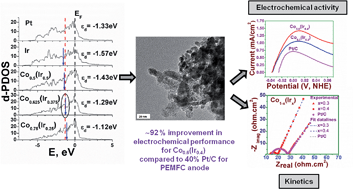Nanostructured robust cobalt metal alloy based anode electro-catalysts exhibiting remarkably high performance and durability for proton exchange membrane fuel cells†‡
Abstract
In recent years, the development of durable and electrochemically active electro-catalyst alloys with reduced noble metal content exhibiting similar or better electrochemical performance than pure noble metal electro-catalysts has gathered considerable momentum particularly, for proton exchange membrane fuel cell (PEMFC) application. Engineering such reduced noble metal containing electro-catalyst alloys in nano-scale dimensions with highly active electrochemical surface area (ECSA) will ultimately translate to reduced noble metal loadings to ultra-low levels which will eventually lead to an overall reduction in the capital cost of PEMFCs. Herein we report the development of nanostructured Co–Ir based solid-solution electro-catalyst alloys for the hydrogen oxidation reaction (HOR) further validated by first principles theoretical calculation of the d band center of the transition metal in the solid solution alloys. The theoretical and experimental studies reported herein demonstrate that the nanostructured alloy electro-catalysts comprising 70 at% Co (Co0.7Ir0.3) and 60 at% Co (Co0.6Ir0.4) of crystallite size ∼4 nm with a high electrochemically active surface area (ECSA) (∼56 m2 g−1) exhibit improved electrochemical activity (reduction in overpotential and improved reaction kinetics) for the HOR combined with outstanding durability in contrast to pure Ir nanoparticles (Ir-NPs) as well as state of the art commercial Pt/C system. Moreover, an optimized alloy containing 60 at% Co (Co0.6Ir0.4) showed a remarkable ∼156% and 92% higher electro-catalytic activity for the HOR than Ir-NPs and commercial 40% Pt/C, respectively, with similar loading and ECSA. The single PEMFC full cell study also shows ∼85% improved maximum power density for the Co0.6(Ir0.4) electro-catalyst compared to 40% Pt/C and excellent electrochemical stability/durability comparable to 40% Pt/C.


 Please wait while we load your content...
Please wait while we load your content...